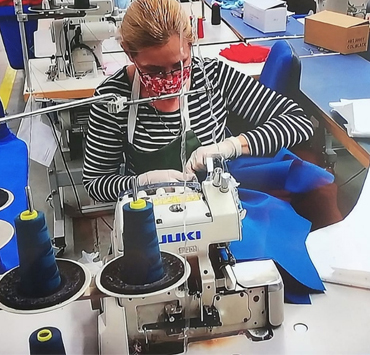Evidence Submission to the MAC Concerning Fashion Employees Now In

25-06-2020
For over one-year now Fashion-Enter Ltd has been fighting for the rights of skilled machinists to ensure they are recognised as ‘skilled’ and can continue to work under the new points-based immigration system.
CEO Jenny Holloway has attended discussions in Parliament, featured in Drapers and appeared on the ITN News to explain why a post-Brexit UK needs to retain this skilled workforce. Collaborating with the All Party Parliamentary Group (APPG) for Textiles and Fashion, MakeUK and many other UK manufacturers, the aim is to get the government to change its stance on machinists – categorised as ‘low-skilled’ and therefore failing to meet the required number of points to work in the UK.
In March 2020, the Home Secretary commissioned the Migration Advisory Committee (MAC) to compile the UK Shortage Occupation List (SOL), which will cover all occupations in the RQF3-5 bracket (medium skills). As a result, the MAC has launched the “Shortage Occupation List: Call for Evidence” until 24 June 2020, end of the day, to hear organizations’ views on:
- The roles that are being filled by migrant workers;
- The salaries they are paid;
- The implications of the potential changes.
From the 1st of June Fashion Roundtable and the APPG for Textiles and Fashion launched a survey to gather evidence from the fashion businesses and professionals in support to advocate for adding the fashion occupations on the SOL. The survey is meant to facilitate adding fashion’s voice for this matter in a short survey that covers the main points from the original MAC call for evidence:
● The rate of turnover in the employment of garment workers;
● The numbers of workers who are from the EU and EEA;
● The time needed to train workers and typical salaries (workers will not qualify for sponsorship without being on the SOL);
● Salary information, since the quota to obtain 20 points in the point-based immigration system is £25,600;
● What actions were taken to meet shortages by training domestic workers and to give an indication to the MAC of an expected timeline for shortages being able to be potentially met with domestic labour after a role has been added to the SOL.

The 21 responses to the deadline of 22nd of June 2020 found:
- Most of the respondents 43%, are from the design segment which reflects the UK fashion industry’s reality overall and fashion in the education system. There are world-famous fashion design courses in the UK but not sufficient talent development in textiles and fashion manufacturing.
- Most of the respondents 62%, are micro-enterprises with 0-10 employees meaning they are less resilient to the increasing training costs of new employees that lack the necessary skills, which was felt by 71% of the respondents in the survey.
- The majority of respondents 71%, would employ EU workers in the new points-based immigration system if the salary rate is at £20,480 (SOL route salary threshold to gain 20 points), compared to 43% of participants if the salary rate is at £25,600 per year (skilled worker route salary threshold to gain 20 points). If the occupations are not on the SOL, it could risk decimating the fashion industry development opportunity by almost half.
- The majority of respondents 57%, consider their workers as highly-skilled to be fit-for-purpose in their job. This observation highlights disparities with the Immigration Rules Appendix J understanding of the skills needed in the fashion occupations.
- The majority of respondents 76%, would keep a vacancy open until finding a worker with the required set of skills, compared to 19% that would employ a worker not having the required set of skills. This demonstrates the existent limitations for development and scaling-up of most businesses in the fashion sector, to which the constraints to access workers in the new points-based immigration system would add additional challenges.
- Quoted evidence from the fashion industry informs that it takes between several months to several years to train textile machinists and workers making products. The industry’s insights demonstrate that textile, garment jobs are skilled and require long-term training.
The UK fashion manufacturing and retail businesses generated about 83,9bn turnover in 2019 and according to 2019 ONS data there were remarkably about 36,850 fashion manufacturing and retail businesses employing about 630,700 people across the UK in 2019. The influential fashion industry is an important part of the UK economy with exports in 2019 worth £14.5bn in clothing, footwear and jewellery goods. The textile and fashion industry has always proved resilient, and in light of Covid-19, the discussions for on-shoring have intensified. Hence, the UK leaving the EU and the implementation of the new points-based immigration system are needed to create an accommodating environment to welcome the opportunities for further development in the fashion industry.
The MAC will report their recommendations to the Government in September 2020 and it will be for the Government to decide on the SOL following the MAC recommendations. Watch this space for the Government’s decision in due course.























